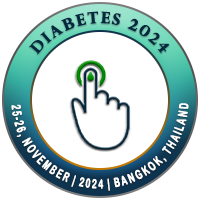
Saifaldeen Al Badawi
Birmingham Heartlands Hospital, UKTitle: Acute exfoliative dermatitis/erythroderma secondary to gliclazide
Abstract
Erythroderma is a general term used to describe severe, intense skin inflammation. The condition is also known as exfoliative dermatitis when it is associated with exfoliation. Erythroderma has many causes, such as adverse drug eruption, dermatitis, psoriasis, pityriasis rubra pilaris, immunobullous disease, cutaneous T- cell lymphoma (Sézary syndrome), underlying systemic malignancy, graft versus host disease, and HIV infection. Many medications can cause erythroderma, including antibiotics, antiepileptics, Angiotensin- Converting Enzyme (ACE) inhibitors, and sulfonamides. Here, we report a rare case of erythroderma secondary to gliclazide, an oral antidiabetic. This presentation is rare, as we found only one case report of gliclazide causing erythroderma in the literature. Erythroderma is considered a medical emergency requiring immediate diagnosis and prompt management; therefore, early intervention should start on suspicion without waiting for dermatologist confirmation, as this will significantly reduce the mortality and morbidity of this potentially life-threatening emergency.
Biography
Saifaldeen Al Badawi completed MBBS in the faculty of medicine at University of Khartoum in Sudan during 2009. He had full membership of Royal College of Physicians in London MRCP UK 2018. Currently he is the acute internal medicine registrar in Birmingham Heartlands Hospital, Birmingham, UK. He had previous experience in A&E speciality doctor in Lincoln County Hospital, Lincoln, UK. He was a general practitioner in Saudi Red Crescent Authority, Al-Khobar, KSA. He was a general internal medicine registrar at Sharq Elneel Hospital, Khartoum, Sudan.

